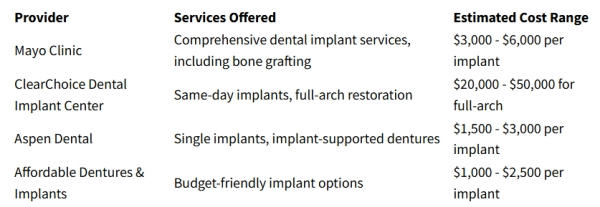Guide to Affordable Dental Implants for Seniors in the US
For older Americans, maintaining dental health is essential for a high quality of life. Missing teeth can hinder eating, speaking, and smiling with confidence. Thankfully, with diligent planning and research, seniors can discover budget-friendly options that do not compromise on quality. This comprehensive guide aims to assist seniors in accessing affordable dental care and enhancing their oral health.

Dental Implants: A Comprehensive Guide for Seniors
Dental implants have revolutionized the field of restorative dentistry, offering a permanent solution for missing teeth. As we age, tooth loss becomes more common, affecting our ability to eat, speak, and smile with confidence. For seniors seeking to restore their dental health and quality of life, dental implants provide a reliable and long-lasting option. This article explores the benefits of dental implants for older adults and highlights some of the best clinics offering this service in the United States.
Understanding Dental Implants
Dental implants are artificial tooth roots surgically placed into the jawbone to support replacement teeth. Made from biocompatible materials like titanium, these implants fuse with the bone over time, creating a stable foundation for crowns, bridges, or dentures. This process, known as osseointegration, ensures that the implants function like natural teeth, allowing patients to eat, speak, and smile without worry.
Benefits of Dental Implants for Seniors
For older adults, dental implants offer numerous advantages over traditional dentures or bridges. They provide improved stability and comfort, eliminating the need for adhesives and reducing the risk of slippage. Implants also help preserve facial structure by stimulating bone growth, preventing the sunken appearance often associated with long-term denture use. Additionally, they allow for a more varied diet, improving nutrition and overall health.
The Implant Procedure Explained
The dental implant process typically involves several stages spread over a few months. Initially, the dentist assesses the patient’s oral health and bone density. If suitable, the implant is surgically placed into the jawbone. After a healing period of several months, an abutment is attached to the implant, followed by the placement of the artificial tooth or teeth. While the process requires patience, the long-term benefits far outweigh the temporary inconvenience.
Addressing Common Concerns
Many seniors have concerns about undergoing dental implant surgery. However, advancements in technology and techniques have made the procedure safer and more comfortable than ever before. Local anesthesia is typically used, and sedation options are available for anxious patients. Recovery time varies but is generally manageable with proper care and follow-up appointments.
Top Dental Implant Clinics for Seniors
When considering dental implants, choosing the right clinic is crucial. Factors to consider include the dentist’s experience, the clinic’s technology, and patient reviews. Some of the top-rated dental implant clinics for seniors in the US include the Mayo Clinic in Rochester, Minnesota, known for its comprehensive care approach, and the ClearChoice Dental Implant Center, with locations across the country offering specialized implant services.
Comparing Dental Implant Options
For seniors exploring dental implant options, it’s essential to compare services and costs. Here’s a comparison of some leading providers:

Note: Costs are estimates and may vary based on individual needs and location. Always consult with providers for accurate pricing.
Making an Informed Decision
Opting for dental implants is an important choice that can greatly enhance the quality of life for seniors. Although the upfront cost tends to be higher than that of traditional dentures, the long-term advantages often make the investment worthwhile. Patients should take into account various factors, including their overall health, bone density, and lifestyle, when determining if implants are the right solution for them. Seeking guidance from a qualified implant specialist can offer tailored advice and treatment alternatives.
